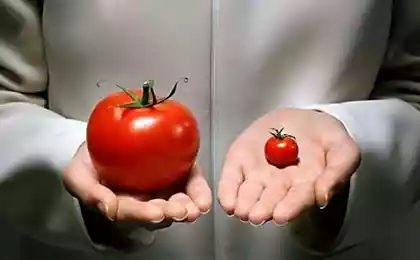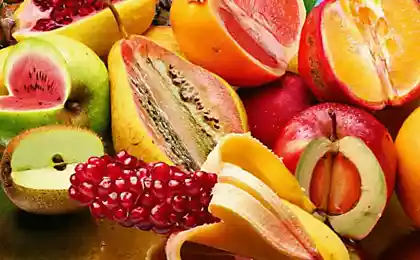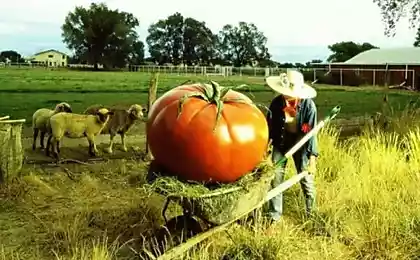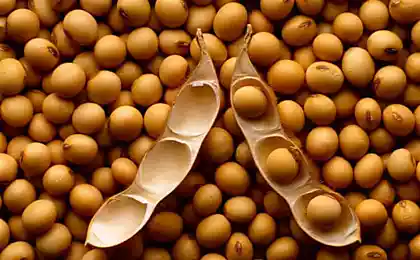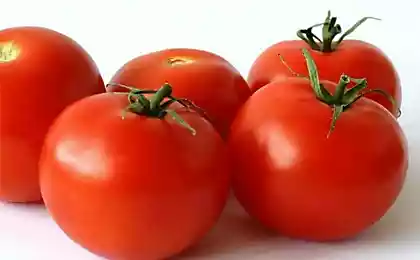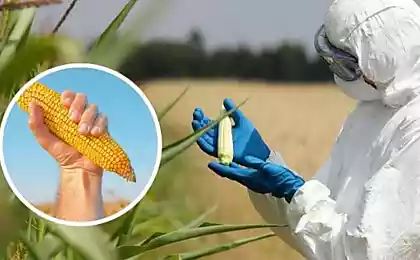853
7-GMO products that will make your brain
For some time now it has become fashionable to deal with genetically modified food. But this is unlikely to stop their development.
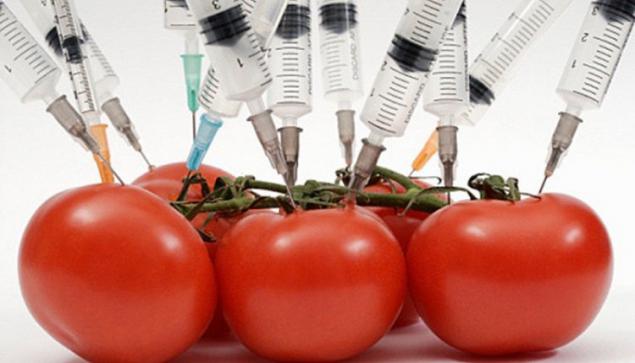
1. "Frankenryba»
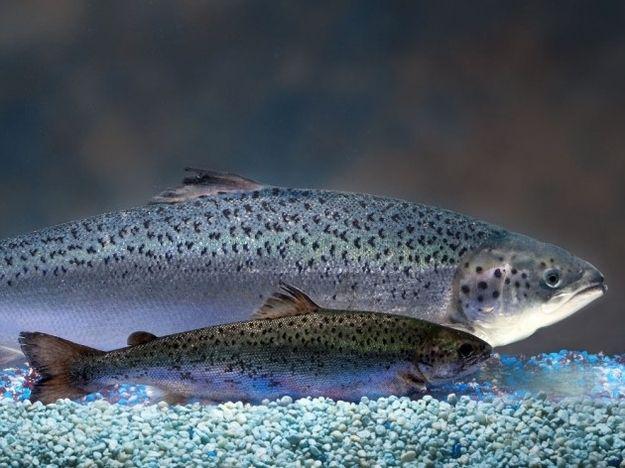
Instead of the usual salmon
At the moment, "frankenryba" explores the Office of FDA Food and Drug Administration. The brainchild of company AquaBounty threatens to develop the market of transgenic fish, "similar to conventional Atlantic salmon».
Sounds like a win-win business model, but environmentalists say that if GMO salmon somehow fall into the usual natural conditions, it will begin to reduce the population of Atlantic salmon more. In addition, long-term prospects of the impact on human health is not known yet.
2. Purple tomatoes
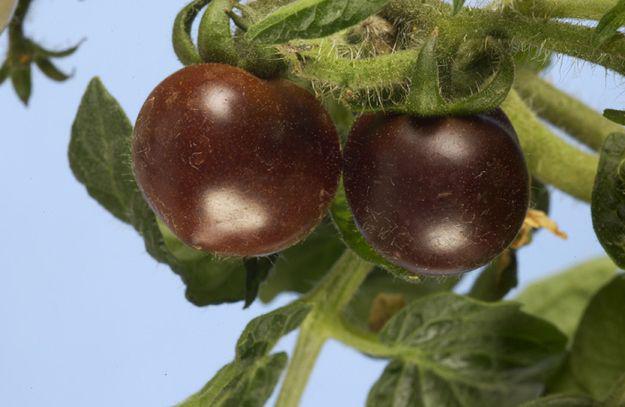
Emphasis on antioxidants
Just remember the series "The Simpsons" with tomatoes crossed with tobacco, is not it? But the reality is more prosaic.
In conventional tomatoes dark color gives tomatoes pigment anthocyanin, a known antioxidant, is also contained in blueberries and cranberries, which helps the body fight cancer and other diseases.
"In these tomatoes you can get the same chemicals that are in blueberries or cranberries," - says Professor Cathy Martin, one of the curators of the project to create artificial tomatoes.
Recent studies, however, show that large amounts of antioxidants can be harmful to people with certain types of cancer. Critics of GMOs are also finding that say: "Nature has already come up with all the products that we need deystvitlno" - says founder EatDrinkPolitics.com, activist Michel Simon.
3. Supersvini
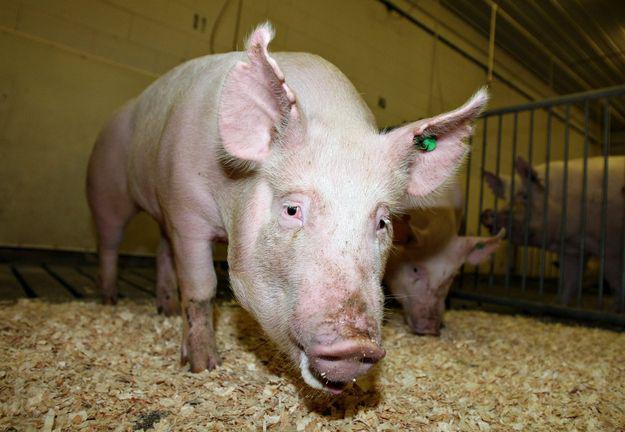
Genetic changes pig manure
A typical pig feed in the United States, Canada and many other countries is made from corn and other grains, which are known even people who are not too good for assimilation. Phosphorus in these cultures - a separate issue, and the output of swine manure can be toxic to surrounding farmland ponds and the environment.
"The problem is not in pigs, - said Kathy Holtslender from Beyond Factory Farming, - The problem of industrialization and mass rearing of pigs in which they fed only for the masses". Nutritional supplement phytase is designed to help the pig to digest and absorb phosphorus without harm. And, of course, all this does not apply to wild pigs are not fed crops.
4. Apple 2.0
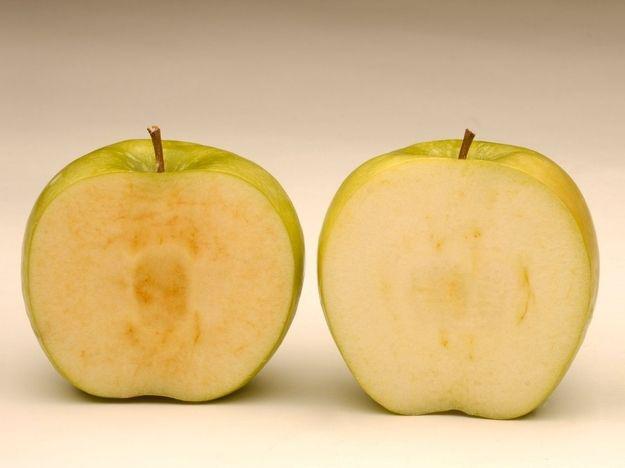
More beautiful
So far, this development seems less necessary and also waiting for the approval of the Office for the Supervision santiranomu. The company Okanagan Specialty Fruits introduced genetic additive that allows Apple does not darken, regardless of how long ago it was cut.
Association of the United States in the apple do not yet know how to treat this. "Can such apples and do not constitute a threat to health, but the question is how the buyer will accept this innovation. How to change his attitude to the apples as a whole? So is it necessary? "- Says Wendy Brannen.
5. Cabbage scorpion
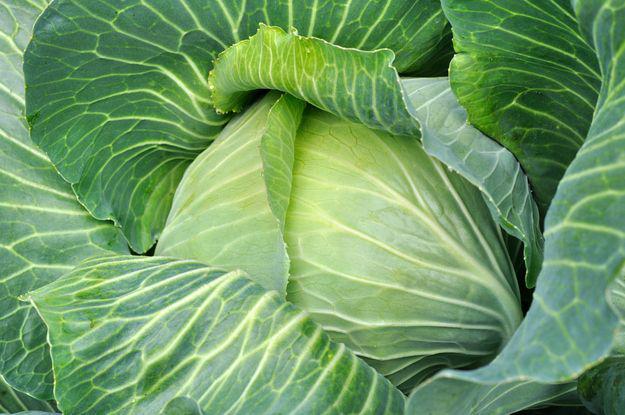
Instead of pesticides
Scientists from Beijing, China, went further, deciding to act in the best traditions of Asian sophistication. They took the strain of cabbage, which contains its own poisons harmful caterpillars without the aid of pesticides and external chemicals. Caterpillars attacking cabbage die, and in relation to a person toxin, the assurance of scientists is harmless.
6. Corn Killer
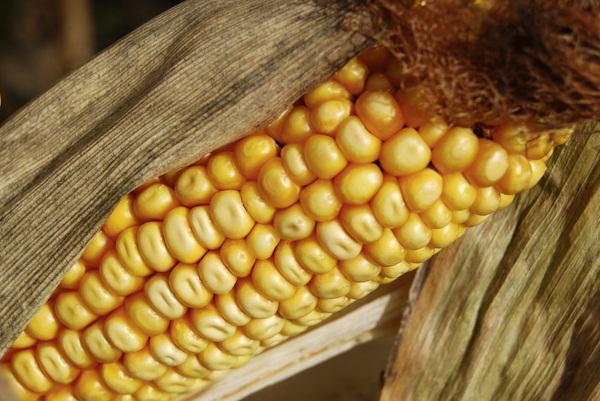
Able to defend themselves
While most of the genetically modified corn used in animal feed, ethanol and processed foods, this particular species is on the shelves of the United States since 2012. It is derived from the genes of three beta-toxins, making corn insecticide by itself.
What does this mean? For example, if corn cobs attacked some crap like insects or parasites, corn itself can be protected. In addition, it contains the so-called gene «Roundup Ready», making corn resistant to herbicides and agro-chemicals.
7. Finally, the breast milk. Now from ordinary cows

Animals learn human skills
Of course, we are accustomed to think that feeding offspring, at least in the early stages of life, this is something with which people cope better than an animal. In China, however, do much to dairy cows could compete with her mother on the issue of human-feeding a baby.
Chinese scientists have introduced human genes into embryos cows back in 2011, creating the cows whose milk "is identical to the human species and has the same imunnostimuliruyuschimi and antibacterial qualities as breast».
The product is still being tested, but animal welfare advocates, as you know, do not share the enthusiasm of scientists. In two experiments, 10 of 42 guinea calves died shortly after birth. The representative of the RSPCA UK said the organization was "very worried" about the way they were produced cows.
Chinese, on the other hand, refer to the high content of protein in the milk and substances inherent to human breast milk. As to the question of the safety of milk for health, the point here is not set, it seems, for a long time. Genetically modified milk only for an extensive clinical trials.

1. "Frankenryba»

Instead of the usual salmon
At the moment, "frankenryba" explores the Office of FDA Food and Drug Administration. The brainchild of company AquaBounty threatens to develop the market of transgenic fish, "similar to conventional Atlantic salmon».
Sounds like a win-win business model, but environmentalists say that if GMO salmon somehow fall into the usual natural conditions, it will begin to reduce the population of Atlantic salmon more. In addition, long-term prospects of the impact on human health is not known yet.
2. Purple tomatoes

Emphasis on antioxidants
Just remember the series "The Simpsons" with tomatoes crossed with tobacco, is not it? But the reality is more prosaic.
In conventional tomatoes dark color gives tomatoes pigment anthocyanin, a known antioxidant, is also contained in blueberries and cranberries, which helps the body fight cancer and other diseases.
"In these tomatoes you can get the same chemicals that are in blueberries or cranberries," - says Professor Cathy Martin, one of the curators of the project to create artificial tomatoes.
Recent studies, however, show that large amounts of antioxidants can be harmful to people with certain types of cancer. Critics of GMOs are also finding that say: "Nature has already come up with all the products that we need deystvitlno" - says founder EatDrinkPolitics.com, activist Michel Simon.
3. Supersvini

Genetic changes pig manure
A typical pig feed in the United States, Canada and many other countries is made from corn and other grains, which are known even people who are not too good for assimilation. Phosphorus in these cultures - a separate issue, and the output of swine manure can be toxic to surrounding farmland ponds and the environment.
"The problem is not in pigs, - said Kathy Holtslender from Beyond Factory Farming, - The problem of industrialization and mass rearing of pigs in which they fed only for the masses". Nutritional supplement phytase is designed to help the pig to digest and absorb phosphorus without harm. And, of course, all this does not apply to wild pigs are not fed crops.
4. Apple 2.0

More beautiful
So far, this development seems less necessary and also waiting for the approval of the Office for the Supervision santiranomu. The company Okanagan Specialty Fruits introduced genetic additive that allows Apple does not darken, regardless of how long ago it was cut.
Association of the United States in the apple do not yet know how to treat this. "Can such apples and do not constitute a threat to health, but the question is how the buyer will accept this innovation. How to change his attitude to the apples as a whole? So is it necessary? "- Says Wendy Brannen.
5. Cabbage scorpion

Instead of pesticides
Scientists from Beijing, China, went further, deciding to act in the best traditions of Asian sophistication. They took the strain of cabbage, which contains its own poisons harmful caterpillars without the aid of pesticides and external chemicals. Caterpillars attacking cabbage die, and in relation to a person toxin, the assurance of scientists is harmless.
6. Corn Killer

Able to defend themselves
While most of the genetically modified corn used in animal feed, ethanol and processed foods, this particular species is on the shelves of the United States since 2012. It is derived from the genes of three beta-toxins, making corn insecticide by itself.
What does this mean? For example, if corn cobs attacked some crap like insects or parasites, corn itself can be protected. In addition, it contains the so-called gene «Roundup Ready», making corn resistant to herbicides and agro-chemicals.
7. Finally, the breast milk. Now from ordinary cows

Animals learn human skills
Of course, we are accustomed to think that feeding offspring, at least in the early stages of life, this is something with which people cope better than an animal. In China, however, do much to dairy cows could compete with her mother on the issue of human-feeding a baby.
Chinese scientists have introduced human genes into embryos cows back in 2011, creating the cows whose milk "is identical to the human species and has the same imunnostimuliruyuschimi and antibacterial qualities as breast».
The product is still being tested, but animal welfare advocates, as you know, do not share the enthusiasm of scientists. In two experiments, 10 of 42 guinea calves died shortly after birth. The representative of the RSPCA UK said the organization was "very worried" about the way they were produced cows.
Chinese, on the other hand, refer to the high content of protein in the milk and substances inherent to human breast milk. As to the question of the safety of milk for health, the point here is not set, it seems, for a long time. Genetically modified milk only for an extensive clinical trials.
